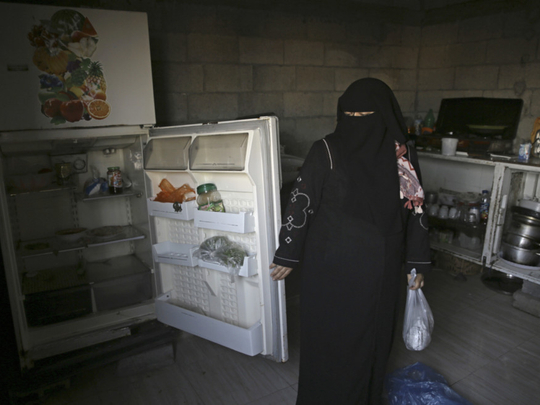
Gaza: Samia Hassan used to have enough money to feed her two dozen children and grandchildren. Now she spends much of her time worrying about food, scouring Gaza’s vegetable markets for end-of-day discounts or walking miles for a pot of free gruel from a soup kitchen.
Large numbers of Gaza families have been pushed deeper into poverty in recent months by Palestinian political infighting and the freezing of US aid.
Life is tougher than ever for most of the 2 million Palestinians locked into tiny, blockaded Gaza, where electricity is off most hours of the day, unemployment approaches 50 per cent.
“It’s a perfect storm,” said Hilary DuBose of the Catholic Relief Services, which has had to forego emergency food distributions because the Trump administration is withholding funds.
“At the same time that the humanitarian situation in Gaza is worsening, humanitarian aid is disappearing.”
Growing despair in Gaza has helped drive popular protests against the border blockade by Israel.
The closure was imposed after Hamas, branded a terrorist group by Israel and the West, seized Gaza in 2007, driving out forces loyal to Palestinian President Mahmoud Abbas.
The escalating crisis also spotlights the lack of a coherent Gaza policy by the external players trying to shape its future.
Israel and Egypt say they need the blockade to contain Hamas, but have not offered a viable plan for Gaza.
The international community wants the blockade lifted, but hasn’t said how it would deal with Hamas, which refuses to disarm or renounce violence.
Hassan - who shares her unfinished cinderblock home with seven of her 12 adult children, three daughters-in-law and 16 grandchildren - said she joined the border protests repeatedly, intentionally getting close to the fence in hopes of getting shot and killed by Israeli troops.
“Death is better than this life,” she said to her sons’ astonishment as the family gathered for the meal breaking the dawn-to-dusk fast of the Muslim holy month of Ramadan.
Hassan said she only pulled back because she realised she could end up crippled rather than dead and become a burden.
In the past two months, more than 130 Palestinians have been killed and close to 3,800 wounded by Israeli fire in near-weekly border protests, with some facing lifelong disabilities.
In the last war in 2014, Hassan says the family taxi, an important source of income, was destroyed in an Israeli air strike on a neighbour’s house.
After the war’s devastation, her sons only found work sporadically and one - a father of six - is now in jail for being unable to pay his debts.
The family suffered a new blow after Abbas ordered his West Bank autonomy government to curtail its regular support payments to Gaza, in hopes of pressing Hamas to hand over authority.
The Hassans used to get $500 every three months from Abbas’ Palestinian Authority, but haven’t been paid since the beginning of the year, along with tens of thousands of Gaza welfare recipients, said Social Affairs Ministry official Khalid Barghouti.
Meanwhile, some 60,000 former civil servants, paid by Abbas since 2007 to ensure their loyalty, have received only a fraction of their salaries since March.
With barely any money coming in, the Hassans increasingly rely on charity.
During Ramadan, Samia Hassan often walks five kilometres to another Gaza City neighbourhood to line up for wheat gruel cooked in a large cauldron over an open fire.
Hassan said her sons won’t make the trip, embarrassed to be seen asking for handouts, but that she doesn’t mind because her face is veiled.
On a recent afternoon, dozens of people jostled, pushing their aluminum or plastic food containers to be filled.
The huge pot was empty within 10 minutes.
“The situation is difficult for everyone,” said Walid Hattab, 50, who owns a small coffee-and-spice store.
Demand is up from last year, he said, noting that merchants have stopped selling on credit.
Along with the Palestinian Authority, the UN has been instrumental in propping up Gaza’s fragile economy. About two-thirds of Gaza’s residents are eligible for health, education or welfare services from UNRWA, the agency that aids descendants of Palestinian refugees from the 1948 war over Israel’s creation.
Need has grown exponentially, with some 1 million people in Gaza now receiving UN food aid, compared to 80,000 two decades ago, said agency spokesman Chris Gunness.
At the same time, the Trump administration has blown a $305 million hole into the agency’s annual $1.2 billion budget - the result of a decision earlier this year to suspend most aid to the Palestinians until further notice. Washington has said it’s linking future funding to UNRWA reforms.
UNRWA has raised more than $200 million from other donors, but is still struggling.
Money for Gaza food distributions could run out in a couple of months, Gunness said.
Additionally, all US assistance to the Palestinians is under review. This includes projects funded by USAID and the State Department, including health, education, good governance and security cooperation programmes.












